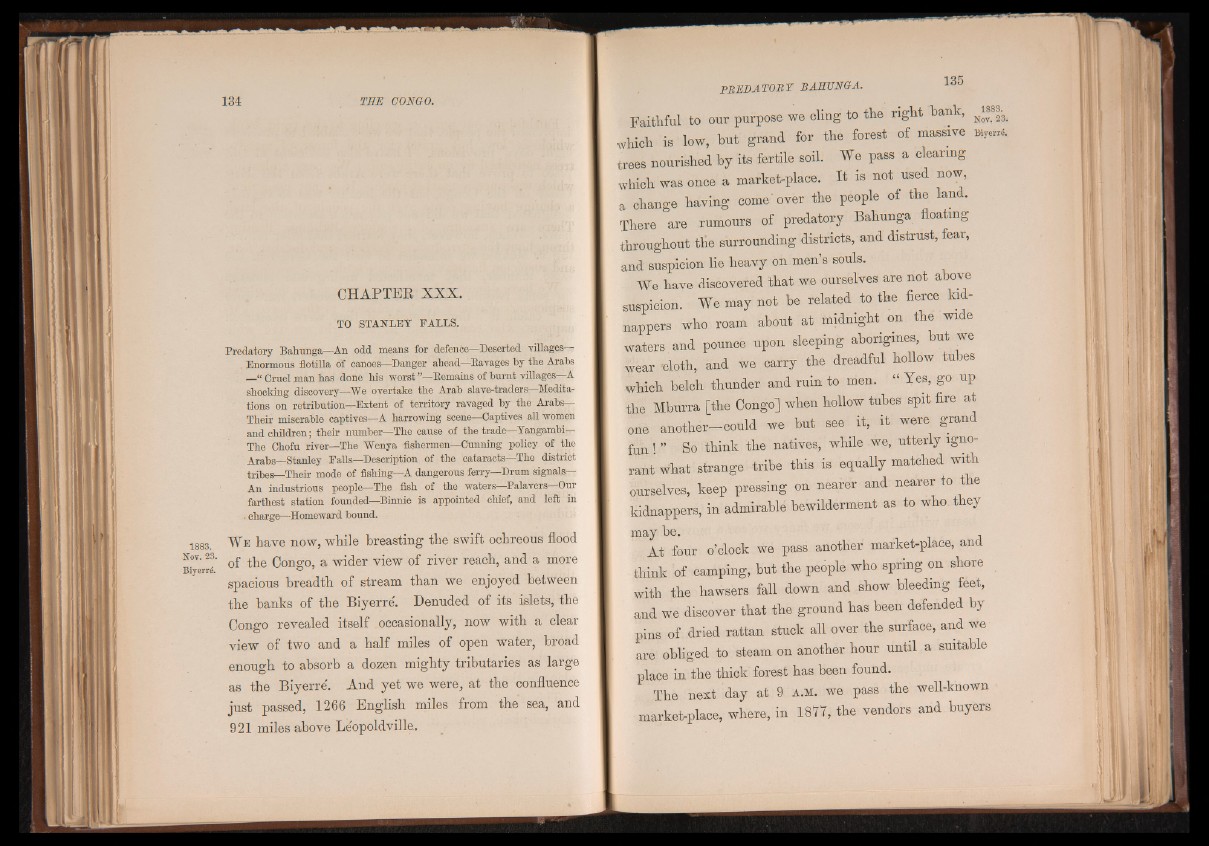
1883.
Nov. 23.
Biyerré.
1 3 4 THE CONGO.
CHAPTER XXX.
TO STANLEY PALLS.
Predatory Bahunga—An odd means for defence—Deserted villages—
Enormous flotilla of canoes—Danger ahead—Bavages by the Arabs
—“ Crnel man has done his worst Bemains of burnt villages—A
shocking discovery—"We overtake the Arab slave-traders Meditations
on retribution—Extent of territory ravaged by the Arabs—
Their miserable captives—A harrowing scene—Captives all women
and children; their number—The cause of the trade—Yangambi—
The Chofu river—The Wenya fishermen—Cunning policy of the
Arabs—Stanley Palls—Description of the cataracts—The district
tribes—Their mode of fishing—A dangerous ferry—Drum signals—
An industrious people—The fish of the waters Palavers' Our
farthest station founded—Binnie is appointed chief, and left in
. charge—Homeward bound.
We have now, while breasting the swift ochreous flood
of the Congo, a wider view of river reach, and a more
spacious breadth of stream than we enjoyed between
the banks of the Biyerre. Denuded of its islets, the
Congo revealed itself occasionally, now with a clear
view of two and a half miles of open water, broad
enough to absorb a dozen mighty tributaries as large
as the Biyerre. And yet we were, at the confluence
just passed, 1266 English miles from the sea, and
921 miles above Leopoldville.
Faithful to our purpose we cling to the right bank, N^ 8®-3<
which 1 low, but grand for the forest of massive Biyeir,
trees nourished by its fertile soil. We pass a clearing
which was once a market-place. I t is not used now,
a change having come over the people of the land.
There are rumours of predatory Bahunga floating
throughout the surrounding districts, and distrust, fear,
and suspicion lie heavy on men’s souls.
We have discovered that we ourselves are not a ove
suspicion. We may not be related to the fierce kidnappers
who roam about at midnight on the wide
waters and pounce upon sleeping aborigines, but we
wear 'cloth, and we carry the dreadful hollow tubes
which belch thunder and ruin to men. | Yes, go up
the Mburra [the Congo] when hollow tubes spit fire at
one another—could we but see _ it, it were grand
fun ! 1 So think the natives, while we, utterly ignorant
what strange tribe this is equally matched with
ourselves, keep pressing on nearer and nearer to the
kidnappers, in admirable bewilderment as to who. they
may be.
At four o’clock we pass another market-place, and
think of camping, but the people who spring on shore
with the hawsers fall down and show bleeding feet,
and we discover that the ground has been defended by
pins of dried rattan stuck all over the surface, and we
are obliged to steam on another hour until a suitable
place in the thick forest has been found.
The next day at 9 a .m . we pass the well-known
market-place, where, in 1877, the vendors and buyers